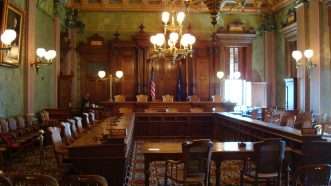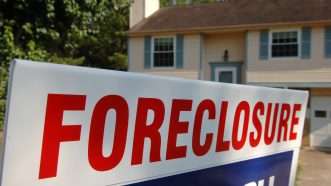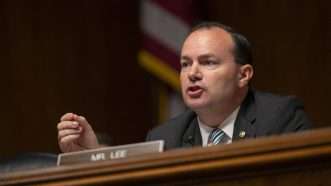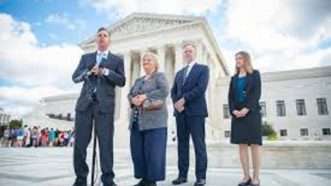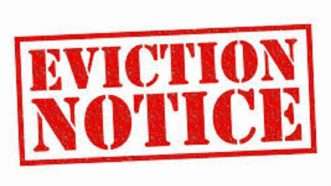Property Rights
Institute for Justice Takes up Case where Federal Court Ruled Government Owes no Compensation to Innocent Property Owner Whose House was Destroyed By Police
The prominent libertarian public interest firm hopes to get the decision reversed, possibly by the Supreme Court.
With This Forfeiture Trick, Innocent Owners Lose Even When They Win
The Institute for Justice asks the Supreme Court to block sneaky tactics that prevent victims of property grabs from recovering their legal costs.
Videos of Panels on Sanctuary Cities and Constitutional Property Rights
I took part in panels on these topics at the recent Federalist Society National Lawyers Convention
Pending Ban on Flavored E-Cigarettes in Massachusetts Authorizes Forfeiture of Vapers' Cars
The bill, which the state House passed yesterday, says police may seize vehicles in which they find untaxed vaping products.
County Says Seizing Home Over $8.41 Tax Debt Was OK Because Counties Need Money
"You have a situation where a person owed $8 and lost their house. I mean, how is that equitable?" asked Michigan Supreme Court Justice Richard Bernstein.
A Michigan Man Underpaid His Property Taxes By $8.41. The County Seized His Property, Sold It—and Kept the Profits.
A state law allows counties to effectively steal homes over unpaid taxes and keep the excess revenue for their own budgets.
Tom Wins the Battle Over Tom's Diner
What happens when preservationists get in the way of a diner owner who is looking to sell his place, retire, and pocket the cash?
Indiana Supreme Court Applies Eighth Amendment to Curb "Oppressive" Asset Forfeitures
The ruling is a continuation of the same case in which the federal Supreme Court ruled that the Excessive Fines Clause of the Eighth Amendment is "incorporated" against state governments and applies to asset forfeitures.
Federal Court Rules there is no Taking if the Police Destroy an Innocent Person's House During a Law Enforcement Operation
The ruling has considerable backing from precedent. But it is nonetheless based on a deeply flawed doctrine.
Sen. Mike Lee Would Let You Decide if Drones Can Fly Less Than 200 Feet Above Your House
The Drone Integration and Zoning Act seeks to expand private property rights and give localities more say in airspace regulation.
Instead of Suing or Appealing to Regulators, These Manhattanites Paid Market Price for Their Condo Views
NIMBYs can keep their views. They just have to pay for them.
Miami Beach's $100,000 Fines for Airbnb Rentals Are Illegal, Court Rules
Miami Beach's crackdown on Airbnb is "in jarring conflict" with a state law capping municipal fines at $1,000 per day, Judge Michael Hanzman ruled.
Minneapolis Doesn't Want Landlords to Check Tenants' Criminal History, Credit Score, Past Evictions
The Minneapolis city council just made the rental business a lot riskier for property owners.
My New Article on the Supreme Court's Recent Decision in Knick v. Township of Scott - an Important Takings Case
The article is now available for free on SSRN.
Republicans Choose Trumpism Over Property Rights and the Rule of Law
Trump is just who he said he'd be four years ago. By rallying around him, Republicans are choosing to brand themselves in his image.
OK for Restaurant to Eject City Councilman Whose Political Positions "Had Financially Harmed" the Restaurant
California public accommodations law has been read as banning discrimination based on "political affiliation," but the court concluded that this didn't apply to discrimination based on "political views" more broadly (or based on votes as an elected official).
The Houston Flooding Takings Litigation Continues
The federal government continues to deny any liability for deliberately flooding thousands of homes and other property in Houston in the wake of Hurricane Harvey in 2017.
New Endangered Species Policy Will Protect Both Property Rights and Rare Frogs
There’s no need to pit property owners against imperiled species.
Assessing Justice Sotomayor's First Ten Years on the Supreme Court
The concerns I expressed about her record on property rights when I testified at her 2009 confirmation hearing were justified. But she has compiled an admirable record on several other issues.
Neighbors Claim Los Angeles 'Emoji House' Is 'Bullying,' Demand New Rules Against Murals
Owners painted the house bright pink and added two funny emojis after neighbors complained about illegal Airbnb rentals.
The City Wants to Evict This Family Because a House Guest Committed a Crime They Didn't Know About Somewhere Else
Under its "crime-free housing program," Granite City, Illinois, holds tenants strictly liable for illegal activity by a household member.
Neighborhood Activists Would Rather Preserve Tom's Diner Than Let Its Owner Retire in Peace
Denver NIMBYs are using historic preservation laws to stop a restaurant owner from selling his diner to a developer so he can retire.
Lawsuit Challenges Ordinance Requiring Eviction of Entire "Household" if One Member Has Committed a Crime
The case was brought on the family's behalf by the Institute for Justice, a prominent public interest law firm.
New York Passed Sweeping, Progressive Rental Regulations. Now It's Getting Sued.
Landlords are suing to overturn state rental regulations that limit how much they can charge tenants and who they can rent to.
John Paul Stevens Was a 'Liberal Champion,' Except When He Wasn't
The late Supreme Court justice was an inconsistent defender of civil liberties.
Update on the Preakness Takings Case
The City of Baltimore has dropped its attempt to use eminent domain to take the Preakness Stakes Horse Race. But questions linger about the city's willingness to continue to use the threat of condemnation to force Preakness and other commercial enterprises to stay in the city.
After 6-Year Fight, Florida Couple Wins Right to Grow Veggies at Home
Local governments can't outlaw home vegetable gardens under a new Florida law.
Indiana Is Still Arguing That It's Constitutional To Seize Your Car for Driving 5 MPH Over the Speed Limit
"Historically the answer to that question is yes, and we're sticking with that position here."
New Law Stops IRS From Stealing People's Money Simply Because It Deems Their Bank Deposits Suspiciously Small
A provision of the Taxpayer First Act requires evidence of other illegal activity for seizures based on "structuring" and mandates prompt hearings.
Clarence Thomas Benchslaps the Federal Government in a Property Rights Case
“Our role is to enforce the Takings Clause as written.”
Supreme Court Overrules Precedent that Created "Catch-22" for Property Owners Attempting to Bring Takings Cases in Federal Court
The close 5-4 ruling is an important victory for constitutional property rights.
Lawsuit Challenges Chicago Towing Racket After City Destroyed Disabled Woman's Van
The lawsuit is the second filed this year challenging Chicago's punitive and corrupt towing program.
No Take-Backs, No Do-Overs, No Data Replevin
A lawyer caught on tape criticizing his client (a judge), in the making of a documentary about the prosecution of rapper Meek Mill.
Asset Forfeiture Funding Has Little Impact on Solving Crimes, Says New Study
A new study by the Institute for Justice says federal asset forfeiture funds have little to no impact on solving crimes, suggesting police are more interested in the revenue it generates
Justice Stevens Admits Error in the Kelo Case—but Also Doubles Down on the Bottom Line
In his recent memoir, he admits he seriously misinterpreted precedent in one of his most controversial decisions, but maintains he still got the result right.
The Supreme Court Should Take the Love Terminal Takings Case
A lower court decision the Supreme Court is currently considering reviewing has important - and dangerous - implications for property rights.
Are Democrats an Anti-Immigrant Party Too?
Recent articles by Tyler Cowen and Farhad Manjoo highlight anti-immigrant effects of many Democrats' policies on zoning and other issues. The party is not quite as bad as the Republicans. But that's damning with faint praise.
Bill de Blasio Is the Worst 2020 Candidate on Property Rights
The mayor of America's largest city is openly contemptuous of private property rights.
A Vivid Description of the Needless Suffering Caused by Laws Banning Organ Markets
A recent Canadian Broadcasting Corporation article describes the travails of a man and his family who have waited eight years for a kidney transplant. Such needless pain could be eliminated by legalizing organ markets.
Will Connecticut Finally Enact Meaningful Eminent Domain Reform?
Fourteen years after the notorious Kelo case, the state where the case originated still has one of the nation's weakest eminent domain reform laws. A bill currently before the state legislature could change that.
They Said This Law Would Fix Blighted Neighborhoods. Instead It's Being Used to Steal People's Homes
And the Pennsylvania state lawmaker who wrote the law is now the judge who hears a lot of the cases.
Testimony on Asset Forfeiture Before the Arkansas State Advisory Committee to the US Commission on Civil Rights
My testimony addressed the general problem of asset forfeiture, the potential impact of the Supreme Court's recent decision in Timbs v. Indiana, and Arkansas' recent reform law.
Baltimore Tries to Use Eminent Domain to Condemn the Preakness Stakes Horse Race
The condemnation is legally dubious. And even if the city prevails in court, it is likely to come out a loser. Baltimore should listen to naysayers who advise letting the neighsayers move to another location.






